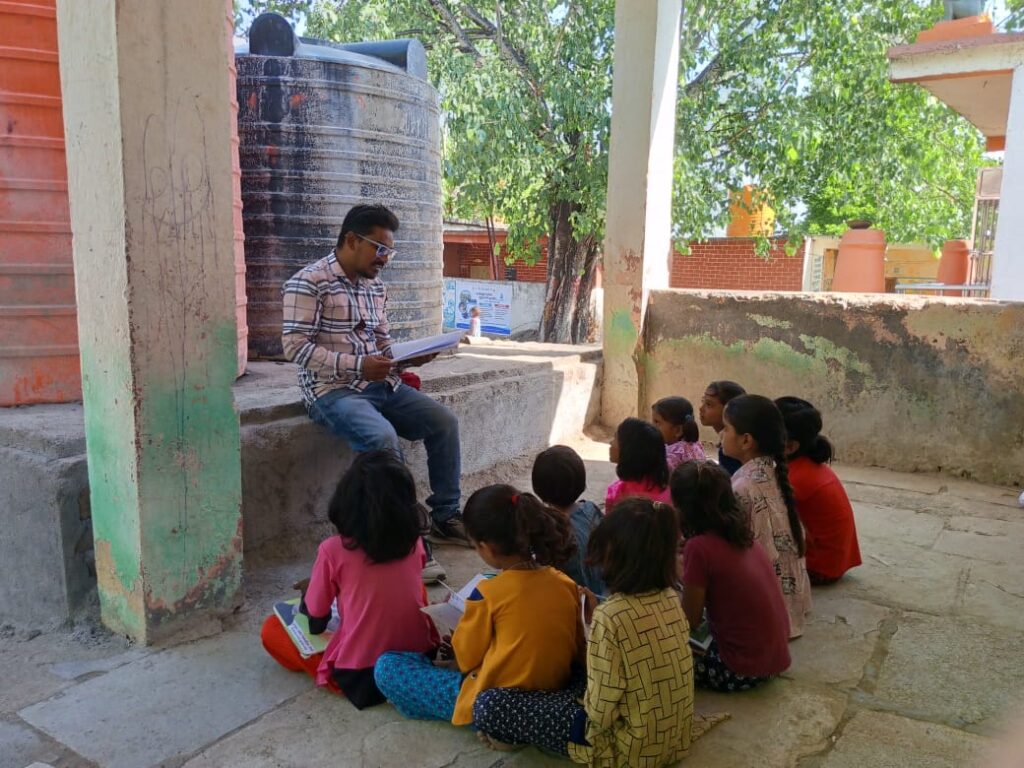Menu
Note: This months newsletter was prepared by our youth volunteer Tanish Peddi.
As mentioned earlier in the previous month’s report, the Earth Foundation is going to organize a summer camp including a few activities to enhance students’ knowledge in multiple aspects. In this newsletter, we will discuss each of these activities in detail. The three activities are about Agriculture, Karrasamu (stick fight), and the Army. This camp was conducted for 26 days in the respective adopted school villages.
Agriculture is the backbone of our country, providing jobs for many people and food for millions and it’s very important for young people to understand how crucial this occupation is. To inspire and teach them, we organized a special summer program for students from our adopted schools. During this program, students met and interacted with farmers from their own villages. The farmers shared their stories and explained the hard work involved in growing crops and bringing food to our tables. They also talked about different methods used in farming, both old and new, to increase crop yields. The students were excited to learn about these processes and gained a deeper appreciation for the efforts of their parents and other farmers. To make the experience more hands-on and interactive, students planted seeds in the gardens of their own schools. This activity helped them connect with the soil and nature, something they don’t often do because they’re usually busy with their mobile devices browsing content on social media. By getting their hands dirty and spending time outdoors, they took a break from their mobile-filled lives and experienced the joy of working with nature. The farmers and nature not only taught the students about agriculture but also helped refresh their minds. Being outside and engaging with the environment improved their mood and brain activity, showing them the value of spending time away from screens and in nature. This experience was both educational and refreshing, highlighting the importance of agriculture and the benefits of connecting with the natural world.
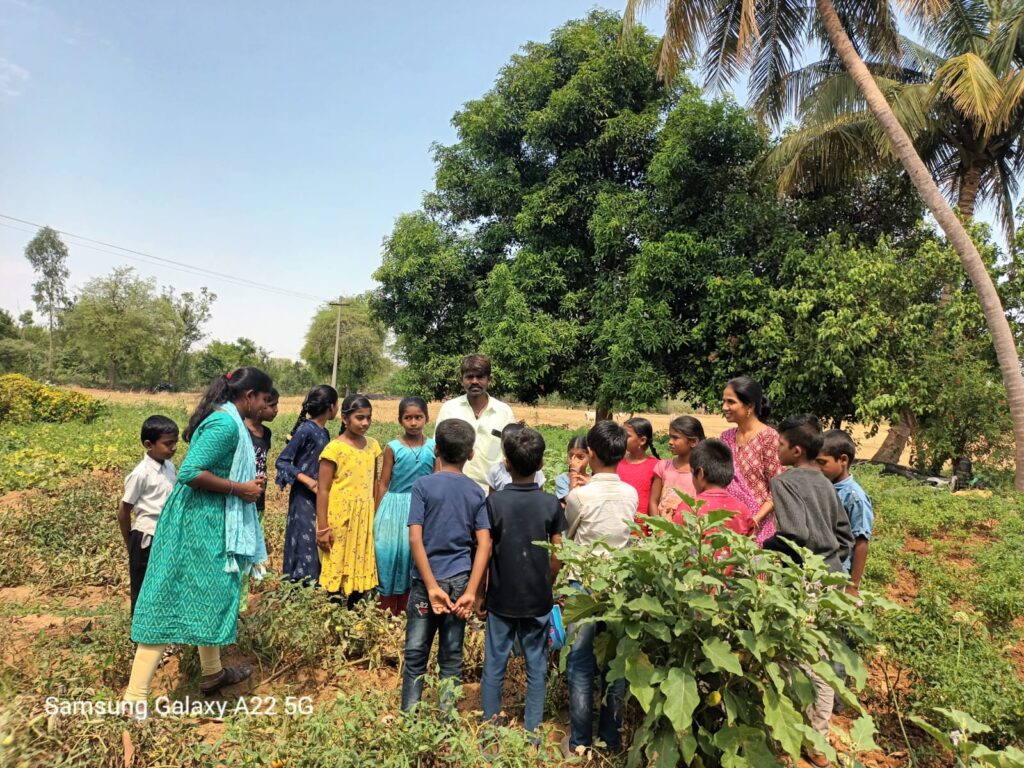
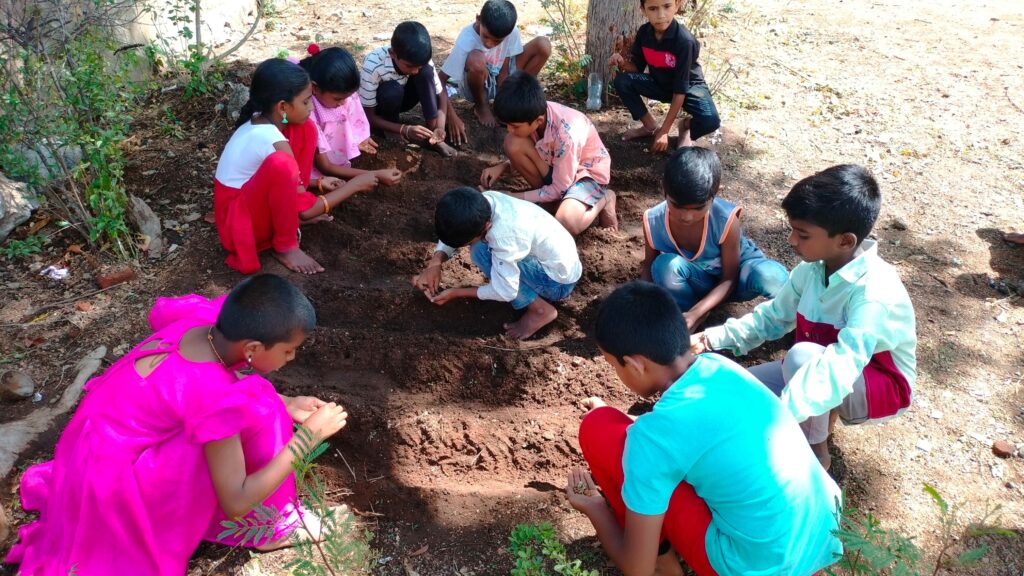
“Karrasamu” is a traditional Indian martial art form in ancient times. It was originally used as a form of self-defense and physical training, and it has now been adapted as a way to teach important life skills to students. The “Karrasamu” practice, an ancient traditional martial art, lasted for 26 days in all of our adopted schools and it experienced an active participation of around 40% from the children. Most of the children were very excited to take part in this unique activity, which importantly contributed to improving their self-confidence. The practice involved a variety of physical exercises and techniques that promote strength, and mental focus. During the 26-day program, the students were taught Karrasamu by their respected Physical Education Teachers (PETs). These teachers are well-trained in the art and ensure that the students learn the techniques correctly and safely. Their involvement adds seriousness to the training, which makes the students more committed to learning. Karrasamu had a number of benefits for the students. It is a type of physical activity that helps children to develop various skills and physical fitness. The serious training improved their stamina, coordination, and overall health—both mental and physical. Moreover, it instilled a sense of discipline as the students had to follow a strict training schedule and the guidelines set by the instructors. By learning and mastering new techniques, the students gained a sense of achievement, which boosted their self-confidence and self-respect. The process of overcoming challenges has improved their skills and self-confidence. Learning in groups and supporting each other during the training also promoted a sense of teamwork. Additionally, Karrasamu taught the students the importance of focus and concentration. There are such movements and techniques where the students are required to pay close attention and be mindful of their actions, which helps improve their mental clarity and focus. These skills are not only useful in martial arts but also beneficial in their academic and personal lives. The students thoroughly enjoyed learning Karrasamu. The excitement of participating in a traditional martial art made the student’s experience more enjoyable. Overall, the Karrasamu practice was a valuable addition to the students’ routine. It provided them with a fun and engaging way to improve their physical fitness, mental focus, and self-confidence. The experience of learning this ancient art form under the guidance of their respected PETs not only enriched their knowledge but also empowered them to believe in their abilities.
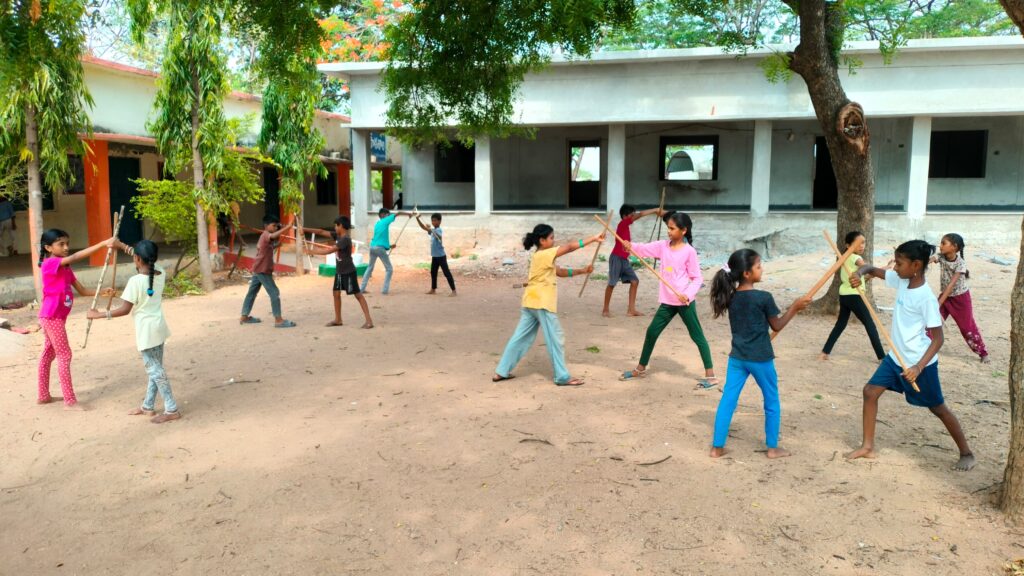
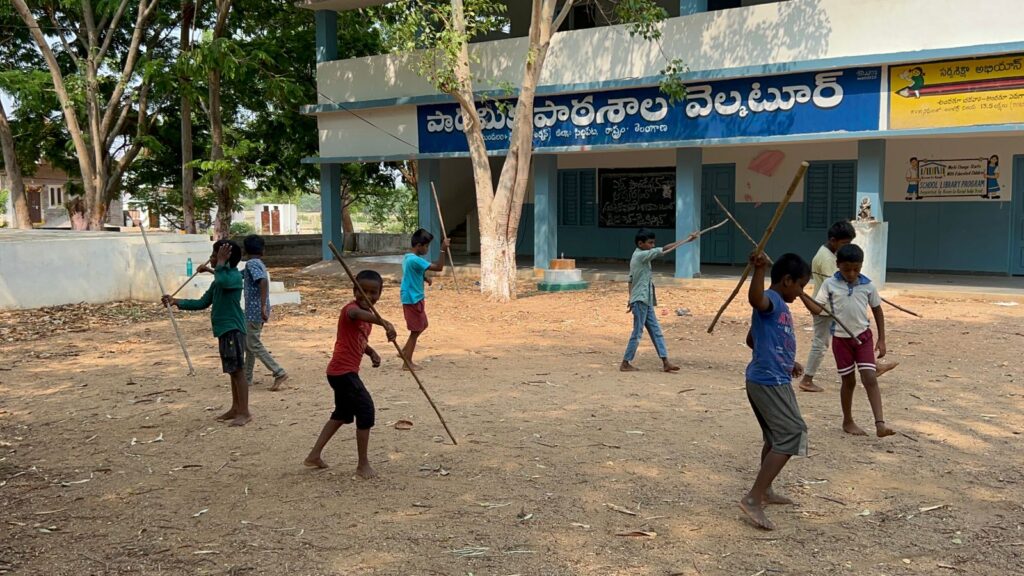
In this third activity, a military service member visited each of our adopted schools for a day, providing students with a unique and inspirational experience. The soldiers shared stories about the difficulties they faced at the border and the immense sacrifices they made for the country. This interaction was arranged to educate the children about the important role of the army and to develop a sense of patriotism and respect for the armed forces. The students learned about the worse conditions soldiers go through while fighting for the nation, including extreme weather, physical exhaustion, and the threat of danger from enemies. The soldier explained the importance of their duties and how they are committed to ensuring the safety and security of the country. This gave the students a deep appreciation for the army’s role and the dedication that soldiers required to serve. During the visit of a soldier, our director, along with the PET and coordinator, conducted a small felicitation ceremony to honor the soldier. This was not only a mark of respect but also an opportunity for the students to witness the recognition of noble service. The students were deeply inspired by the soldier’s words. They eagerly asked questions about life in the army, training, and how they could prepare themselves to serve the country in the future. The interaction developed a sense of aspiration among the students, with many students expressing a goal to join the armed forces and contribute to the nation’s security and safety. This initiative also highlighted the contributions of both farmers and soldiers to the country. Just as students had previously learned about the importance of agriculture through the “Karrasamu” practice, they now understood the sacrifices made by soldiers. By exposing students to the dedication of these two crucial professions, the program aimed to develop an idea of the values of hard work, patriotism, discipline, and service. Overall, the visit from the soldiers was a great experience for the students. It provided them with valuable knowledge about the army, inspired them to consider serving the nation, and allowed them to understand the importance of both agriculture and defense in protecting the country.
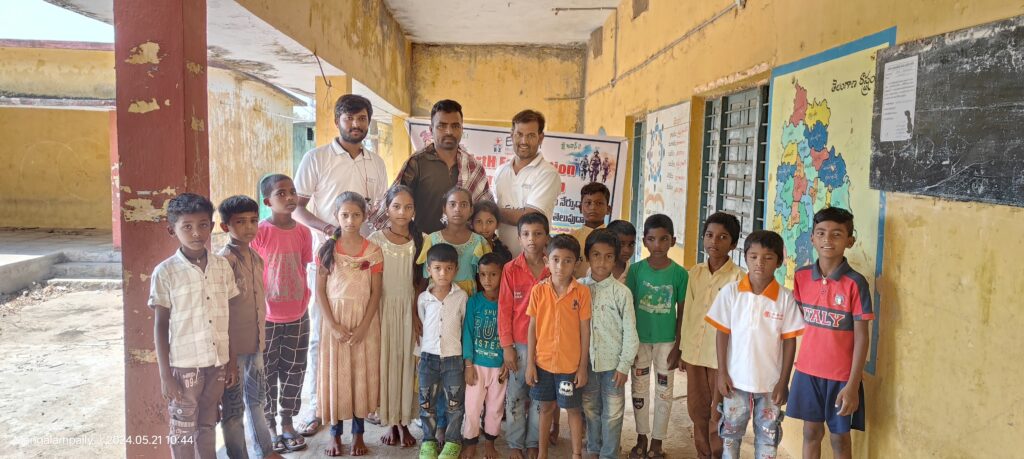
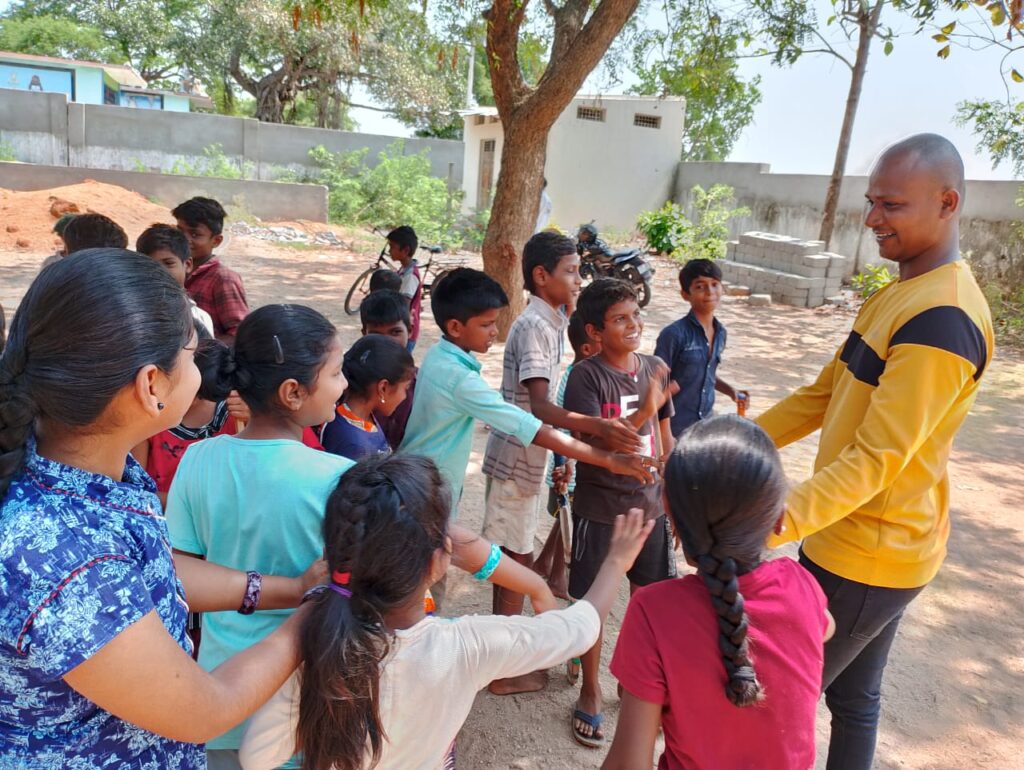
To create awareness about the summer camp, a rally was organized involving students, teachers, and volunteers. The goal was to inform the community about the benefits and opportunities provided by the camp and to encourage participation from students who might otherwise prefer to enjoy their summer break without engaging in educational activities. Many students typically wish to spend their summer vacations relaxing and having fun, often showing little interest in attending school or participating in programs. Recognizing this, the rally aimed to highlight the unique aspects of the summer camp. During the rally, participants walked through the village with banners that explained the various activities offered at the camp, such as interactive sessions with farmers and soldiers, physical fitness programs like “Karrasamu”, and other engaging educational experiences. The rally was not only to attract students but also to inform parents and other villagers about the camp. Volunteers also individually met every student and their parents about the camp and highlighted the camp’s role in keeping children productively engaged during the summer, helping them develop new skills, and providing a safe environment for learning and growth. Overall, the rally successfully created awareness about the summer camp, emphasizing its benefits and encouraging participation. In the end, it was able to attract a good amount of children and allowed them to join the camp and improve their skills.
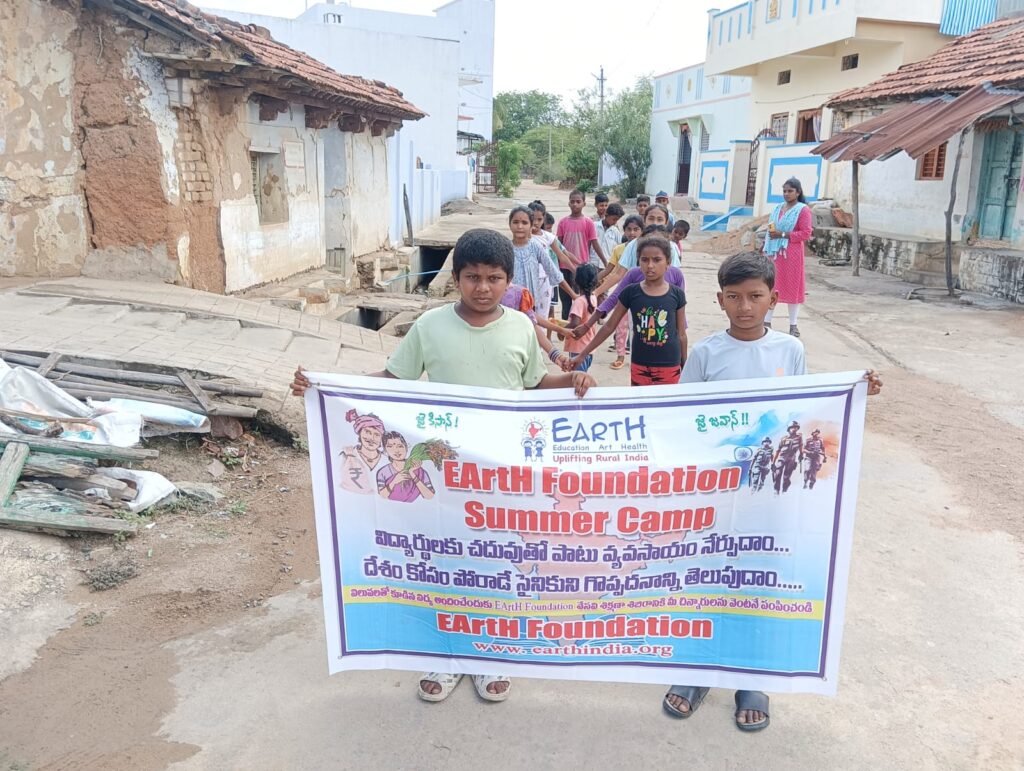
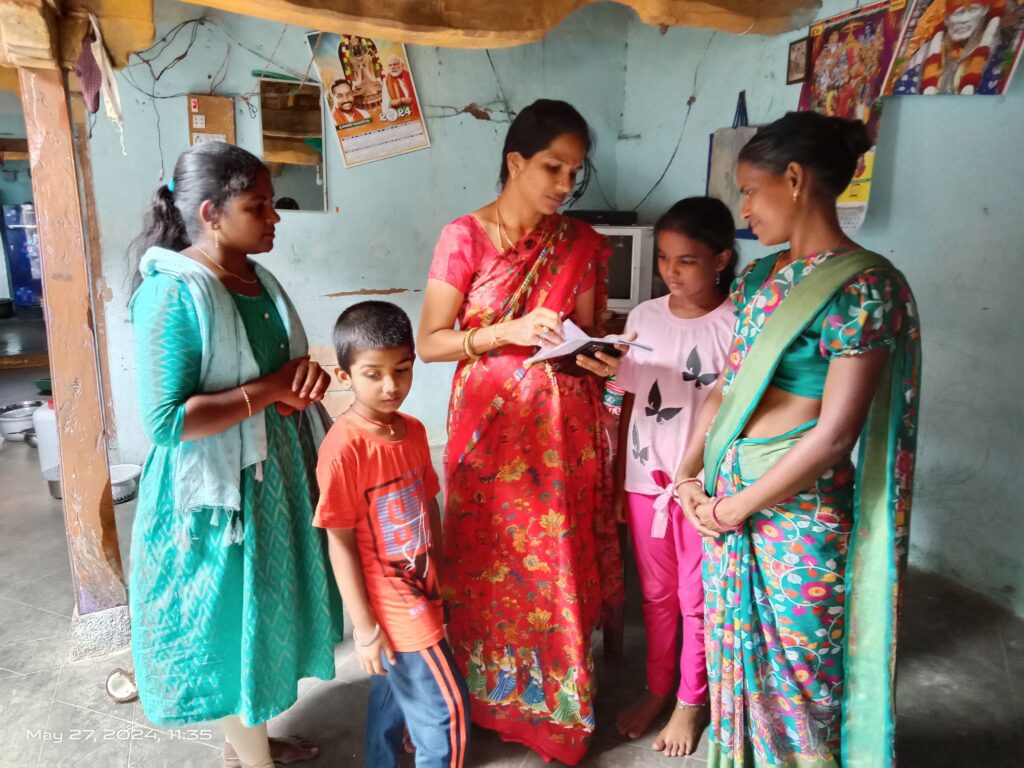
As said before, the EArtH Foundation has decided to make our children’s summer holidays productive by conducting a summer camp that includes many activities to enhance their skills. In Telangana, the camp was conducted in three different categories. However, in Maharashtra, the camp was different. The activities consisted of mind games, story reading, drawing, yoga, dance, indoor games, speech, storytelling, handwriting, carrom board, singing, rangoli, meditation, and general knowledge. This camp was for 45 days and started on May 1 and will be continued till June 15. This camp was conducted at Zilla Primary School, Rahegaon under the guidance of Shri Sanjay Gujrwad (M.A. District P.P. School, Rahegaon) and Shri Dnyanoba Suryavanshi from the EArtH Foundation.
These mind games encompass a diverse array of challenges, each meticulously designed to engage students in rigorous problem-solving activities. By presenting a variety of mental exercises, these games compel students to think both critically and creatively to solve intricate puzzles, recall detailed information, and devise innovative solutions. The benefits of these mind games are multifaceted. Firstly, they significantly enhance critical thinking skills. Students are encouraged to analyze problems from multiple angles, identify patterns, and apply logical reasoning to find solutions. This process not only sharpens their analytical abilities but also fosters a mindset geared towards systematic problem-solving. Secondly, these games serve as excellent tools for boosting cognitive skills. The mental exercises involved require students to engage in complex thought processes, thereby stimulating brain activity. This leads to improved memory, better concentration, and heightened mental agility. The cognitive benefits gained from these activities are long-lasting and can greatly enhance students’ academic performance and everyday problem-solving abilities. Moreover, the diverse nature of these mind games ensures that students remain actively engaged. The variety of challenges prevents monotony, keeping students interested and motivated. This sustained engagement is crucial for continuous cognitive development, as it encourages consistent practice and the application of learned skills. Additionally, these games promote creativity and innovation. By requiring students to think outside the box and explore unconventional solutions, they nurture creative thinking. This ability to approach problems with a fresh perspective is invaluable, not only in academic settings but also in real-life situations where innovative solutions are often required. Furthermore, the collaborative aspect of many mind games fosters teamwork and communication skills. Students often work together to solve problems, which helps them develop their ability to communicate ideas effectively, listen to others, and work as part of a team. These social skills are essential for success in both academic and professional environments. In conclusion, the incorporation of mind games into the educational curriculum offers a holistic approach to learning. These games are not merely a source of entertainment; they are powerful educational tools that enhance critical thinking, boost cognitive skills, promote creativity, and foster teamwork. By continually challenging students and keeping them engaged, these games prepare them to tackle complex problems both in and out of the classroom, equipping them with essential skills for lifelong success.
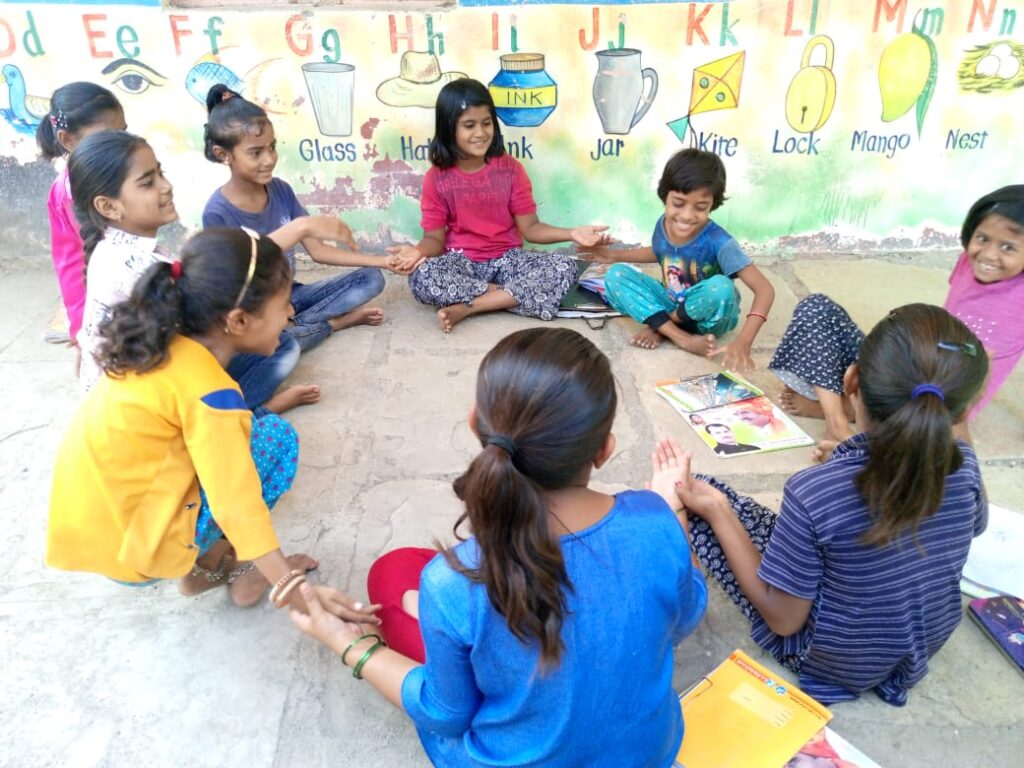
Storytelling is an exceptionally powerful activity that captivates students’ imaginations, allowing them to envision vivid scenarios and deeply connect with the emotions of various characters. By engaging with stories, students are transported to different worlds, which helps them develop empathy and a better understanding of diverse perspectives. Academically, storytelling plays a significant role in enhancing students’ language skills. Exposure to rich, varied vocabulary and complex sentence structures within stories introduces new words and improves comprehension. This, in turn, boosts their reading abilities, enabling them to follow narratives more effectively and retain information with greater ease. Moreover, storytelling nurtures critical thinking and analytical skills as students interpret plots, identify themes, and predict outcomes. This mental engagement helps improve their focus and retention, essential components of proficient reading and learning. The moral lessons embedded in stories are equally invaluable. These lessons provide students with insights into ethical and social values, fostering their moral development. Through stories, students learn about virtues such as honesty, kindness, and perseverance, which shape their character and influence their behavior in real-life situations. Incorporating storytelling into the educational curriculum not only makes learning more enjoyable but also promotes holistic development. It enriches students’ cognitive and emotional growth, enhances their communication skills, and instills in them a lifelong love for reading and learning.
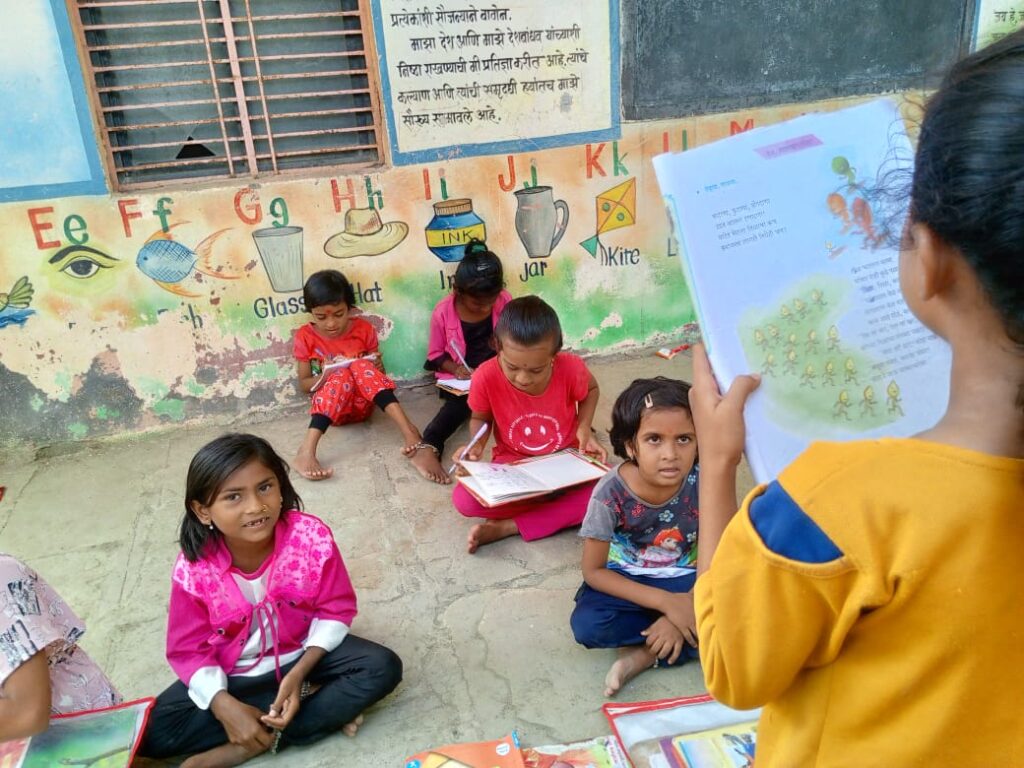
Poems are unique forms of storytelling where deeper meanings and emotions are often embedded within carefully chosen words and structured verses. These intricate layers of meaning are skillfully unveiled by dedicated volunteers who teach and clearly explain the poems to students, helping them grasp the underlying messages and moral lessons. The process of studying poetry enriches students’ educational experience in several ways. Firstly, it introduces them to a wide array of literary techniques, such as metaphor, simile, alliteration, and rhyme, which enhance their appreciation for the artistry involved in crafting poetry. This exposure not only broadens their understanding of language but also inspires them to experiment with their own creative expressions. Secondly, through the exploration of poetry, students become acquainted with many great authors and poets from different eras and cultures. This not only enhances their literary knowledge but also provides historical and cultural contexts that deepen their appreciation for the diversity of human experience and thought. Moreover, the interpretive nature of poetry analysis fosters critical thinking and analytical skills. Students learn to read between the lines, recognize themes, and connect the emotional tone of the poem to its broader message. This practice of interpretation and analysis is invaluable, as it encourages them to think deeply and consider multiple perspectives. Engaging with poetry also has a profound impact on students’ emotional and empathetic development. As they explore the feelings and experiences conveyed in poems, they develop a greater capacity for empathy and emotional intelligence. This helps them relate to others’ experiences and emotions more deeply, fostering a sense of compassion and understanding. In addition, the rhythm and meter of poetry enhance students’ auditory skills and memory. Reciting poems and engaging in poetic discussions can improve their listening and speaking abilities, as well as their overall linguistic fluency. Overall, incorporating poetry into the curriculum not only makes learning more dynamic and engaging but also contributes significantly to students’ intellectual and emotional growth. It helps them develop a lifelong appreciation for literature and the arts, enriches their understanding of language and expression, and cultivates essential cognitive and emotional skills that will benefit them throughout their lives.
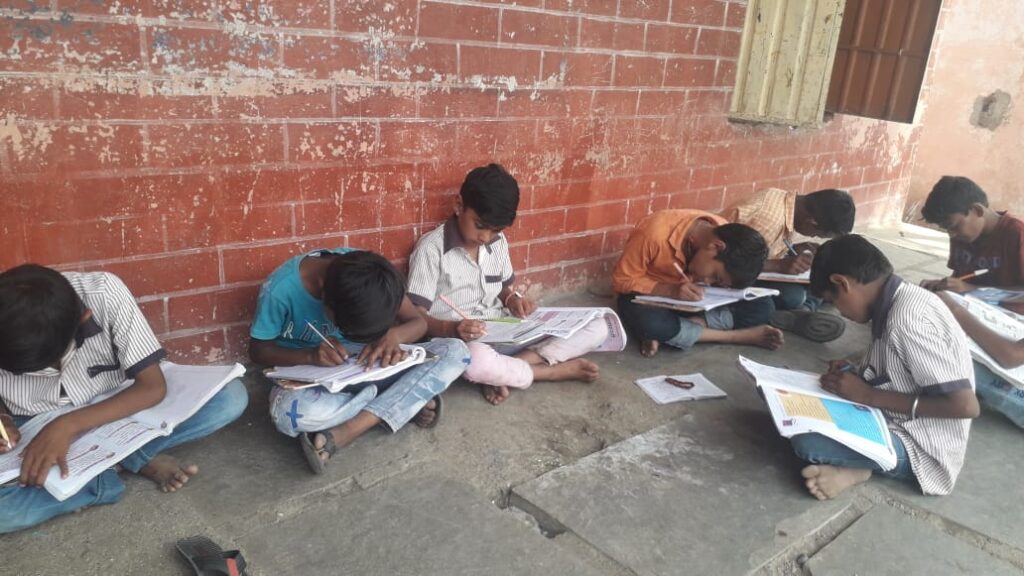
It is essential for students to be aware of the events and developments happening around them, as this awareness significantly enhances their overall knowledge and understanding of the world. Recognizing the importance of this, volunteers have initiated comprehensive general knowledge sessions for students. These sessions are meticulously structured to explain each topic in detail, ensuring that students grasp the nuances of various subjects. The general knowledge curriculum encompasses a wide range of topics, including current events, history, geography, science, and culture. By covering such diverse areas, students gain a well-rounded understanding of the world. This broad knowledge base is crucial for their academic growth and personal development. One of the primary benefits of these sessions is the improvement in students’ critical thinking skills. As they learn about different events and phenomena, they are encouraged to ask questions, analyze information, and form their own opinions. This process fosters a more inquisitive mindset, driving them to seek further knowledge and engage in lifelong learning. Additionally, detailed explanations provided by the volunteers help students comprehend complex topics more easily. Volunteers break down information into manageable parts, using relatable examples and interactive teaching methods to enhance understanding. This approach not only makes learning more engaging but also ensures that students retain the information better. Moreover, these general knowledge sessions help students develop a global perspective. By learning about different cultures, countries, and international events, students become more culturally aware and empathetic. This global awareness is vital in today’s interconnected world, as it prepares students to interact effectively with people from diverse backgrounds. Another significant aspect of these sessions is the development of communication skills. As students discuss various topics, they learn to articulate their thoughts clearly and confidently. Engaging in debates and group discussions also helps them hone their public speaking and listening skills, which are essential for their future academic and professional endeavors. Furthermore, staying informed about current events and general knowledge topics boosts students’ confidence. They feel more equipped to participate in discussions, answer questions, and contribute to conversations on a variety of subjects. This confidence can positively impact their academic performance and social interactions. In conclusion, the initiative taken by volunteers to teach general knowledge to students is immensely beneficial. It not only enriches their understanding of the world but also enhances critical thinking, communication, and global awareness. By explaining each topic in detail and using interactive methods, volunteers ensure that students are well-informed and prepared to navigate the complexities of the modern world. This comprehensive approach to education fosters intellectual curiosity and equips students with essential skills for lifelong success.
